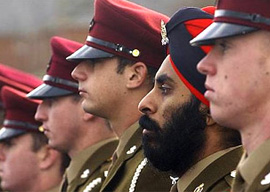
April 09, 2012

Of course there were incidents involving race. I saw racist graffiti during my service in the toilets at Camp Doha in Kuwait, where some angry Marine had scribbled, “Get the Latinos and Blacks out of the USMC.” In the toilets on the British camps there was graffiti, too. It made me smile that ours was along the lines of, “My regiment’s better than your regiment.” In our graffiti, paratroopers would fight the Marines and engineers would fight the artillery, but they”d never fight each other. On the camp in Iraq we had British soldiers who were Welsh, English, Irish, Scottish, Chinese, Fijian, Trinidadian, South African, Pakistani, and Nepalese. They all wore the same uniform, the same flag on their arms. They were all held to the same standards. My sergeant major asked only two things of his men. You had to be fit and you had to know your job. If you weren”t fit, you couldn”t soldier. If you didn”t know your job, you couldn”t soldier. But if you ticked those two boxes, you could be a soldier in his Army.
During a field exercise once, a Muslim soldier attached to my unit insisted on praying five times a day wherever he was. I knew he could catch up on his prayers later, but he insisted on stopping the exercise. After a few times I”d had enough. I told him he was being unreasonable and that if we were in Iraq he couldn”t stop the war to pray. Instead of taking my point, he accused me of being a racist. This wasn”t racism, it was common sense. This soldier didn”t lack acceptance; he lacked intelligence.
During my time on operations, Asians at home would question my parents why their kid was in the “white man’s Army,” which made me think the British Army had accepted ethnic minorities but the minorities hadn”t accepted the Army. Going home on leave to Burnley, Muslims would argue with me in the street, telling me I was killing fellow Muslim brothers. BNP supporters would tell me they couldn’t understand what a brown face was doing in a British uniform. But there are many brown faces in the Army, more so than in the Air Force or Navy by comparison, and these brown faces are fighting and dying alongside the white ones.
The British Army says it wants more ethnic minorities to join. It saddens me to read of soldiers who’ve had a bad experience. I never felt like a second-class citizen. I felt the Army was egalitarian. I’m sure it will continue to have problems as will any organization, but there are no more “D factor” soldiers and racism certainly isn’t endemic. Back at my high school in the 90s you could tell there was a race problem by where you sat in the canteen. I avoided tables of white kids and sat with the Asian kids. In the Army I could sit at any table.